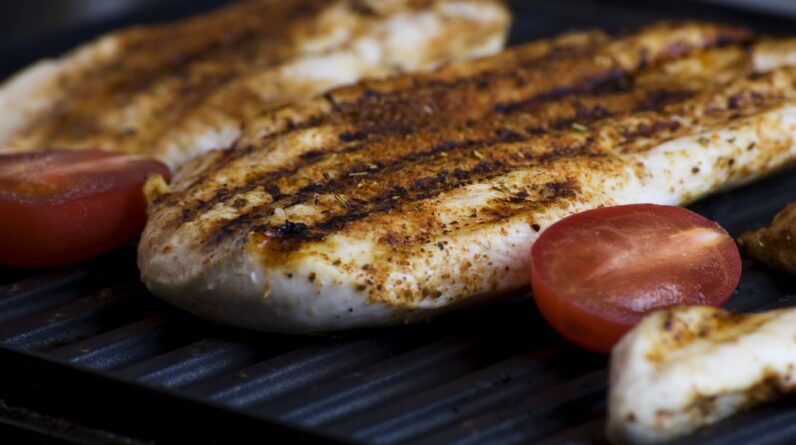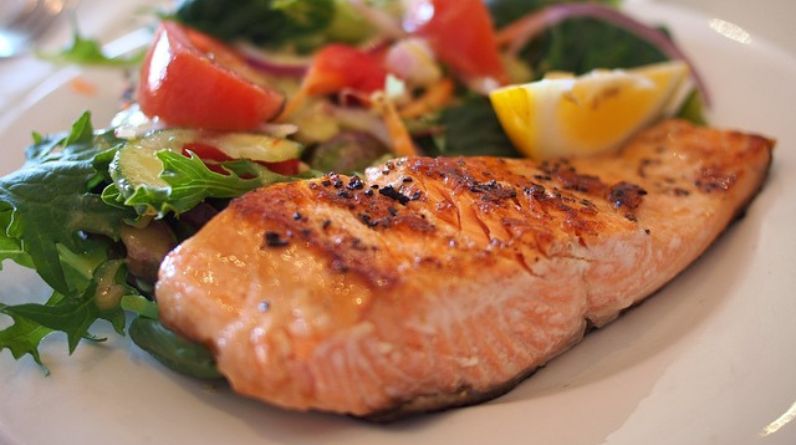
Fueling Your Journey to Strength
Building muscle needs more than just lifting weights; it also necessitates a deliberate approach to diet. The nourishment you give your body is critical to the efficiency of your training. This article looks into the world of the best muscle-building foods, revealing the nutritional powerhouses that can boost your gains and shape your desired physique.
Understanding the Role of Nutrition in Muscle Building
1. Protein: The Building Block of Muscle Growth
Protein is the primary structural component of muscles. It contains amino acids, which are necessary for muscle repair and growth. For optimum muscular development, you must consume an adequate amount of protein. Complete protein foods, such as lean meats, fish, eggs, and dairy, supply the whole spectrum of necessary amino acids required for healthy muscle building. Meeting your protein demands, whether from animal or plant sources, is critical to the effectiveness of your muscle-building efforts.
2. Complex Carbohydrates: Your Workouts Fuel
Carbohydrates are the body’s major energy source, so they are essential for maintaining energy levels during workouts. Choosing complex carbs like whole grains, oats, sweet potatoes, and quinoa ensures a slow and steady release of energy. This consistent energy release allows for longer and more intense workouts, allowing you to push your limitations and maximize the effectiveness of your activities. Carbohydrate balance is essential for meeting the energy demands of your muscle-building regimen.
3. Healthy Fats: Essential for Hormone Production
Contrary to popular belief, lipids serve an important role in hormone manufacturing, particularly testosterone, a hormone essential for muscular building. Incorporating sources of healthy fats into your diet, such as avocados, nuts, seeds, and olive oil, contributes to a well-rounded approach to nutrition. These fats are not only high in energy, but they also help to maintain hormonal balance, producing an environment favorable to muscle building. It is critical to include them in your diet if you want to achieve a thorough and successful muscle-building approach.
4. Micronutrients: The Little Giants
Micronutrients, which include vitamins and minerals, are frequently overlooked despite their importance in a variety of physiological functions, including muscle function. A varied diet rich in fruits, vegetables, and leafy greens is essential for meeting your micronutrient requirements. These “small giants” play an important role in enzyme processes, energy metabolism, and overall health. A well-balanced micronutrient intake supports the intricate mechanisms that allow your muscles to work at their best for optimal muscle function and recovery.
Crafting Your Muscle-Building Diet
1. Meal Timing: Precision Matters
Meal timing is an important aspect in optimizing muscle protein production. Your muscles are more receptive to nutrition after an exercise. It is critical to consume a protein-rich supper or snack within two hours of your workout to maximize muscle repair and growth. This is the time when your body can make the best use of protein amino acids to rebuild and strengthen muscle fibers. Precision in meal scheduling guarantees that your gym efforts result in visible gains in muscle build and strength.
2. Hydration: The Overlooked Ally
Adequate hydration is a frequently overlooked ally in fostering good muscular performance. Water is required for several physiological activities, such as nutrient delivery, joint lubrication, and general performance. Sweating causes fluid loss after strenuous workouts, making optimal hydration levels critical. Staying hydrated throughout the day ensures that your body can transfer nutrients to muscles adequately, lowering the chance of cramping and maintaining overall muscle performance.
3. Pre- and Post-Workout Nutrition: Fine-Tuning Gains
What you consume before and after your workout can help you fine-tune your muscle-building efforts. A combination of protein and carbohydrates before exercise offers the energy required for an effective workout. This combination promotes muscle recovery and growth by replacing glycogen stores and supplying necessary amino acids post-workout. Fine-tuning your nutritional diet throughout these important periods boosts overall energy levels, improves performance, and speeds up the recuperation process, allowing you to get the most out of your muscle-building efforts.
Conclusion
Finally, the quest to master the art of muscle-building extends beyond weightlifting and includes a deliberate and thorough approach to nutrition. The basis of optimal muscle growth is your dietary choices, with an emphasis on including the greatest muscle-building foods. Protein-rich foods such as lean meats, eggs, and dairy, complex carbohydrates for sustained energy, healthy fats essential for hormone production, and a wide range of micronutrients from fruits and vegetables are examples.
It is critical to understand the timing and composition of your meals. Precision in meal scheduling, particularly within the two-hour window following a workout, can dramatically increase muscle protein synthesis, allowing for effective muscle repair and growth. Hydration, which is sometimes underestimated, emerges as a potent ally, regulating nutrition delivery, joint lubrication, and general muscle performance. Maintaining proper hydration, especially during intensive workouts, aids in physical performance.
It is impossible to overestimate the importance of pre- and post-workout nutrition. A well-balanced protein-carbohydrate combination before exercise offers the energy needed for a productive session, while a similar mix post-workout aids muscle recovery by replacing glycogen stores and delivering vital amino acids. This fine-tuning of nutritional intake during vital moments not only improves energy levels and performance, but also hastens recovery, maximizing the gains received from your committed muscle-building efforts.
In essence, by combining the best muscle-building nutrients, judicious meal timing, and consistency in your exercise plan, you construct a solid foundation for not only muscular development but also overall well-being. The interaction of nutrition, exercise, and recuperation provides a harmonic environment for optimal muscle growth, allowing you to become a healthier, stronger, and more robust version of yourself.
Frequently Asked Questions
1. Is it possible to gain muscle without consuming animal products?
Building muscle on a plant-based diet is not only doable, but also becoming more fashionable. Plant-based protein sources such as beans, lentils, tofu, and quinoa supply the amino acids required for muscular building. Many athletes and bodybuilders adhere to vegetarian or vegan diets, highlighting the need for a well-planned, protein-rich plant-based diet for muscle building.
2. How many meals should I eat per day for muscle growth?
The frequency of meals is less important than meeting your daily macronutrient and calorie requirements. Some people like three larger meals each day, while others prefer many smaller meals per day or a combination of the two. Consistency is crucial, as is having enough protein, carbs, and fats throughout the day to support muscle building.
3. Are supplements necessary for muscle building?
While supplements are not required, they can help supply nutritional shortages. Protein supplements, such as whey or plant-based protein powders, can assist in meeting protein needs. Creatine, BCAAs (branched-chain amino acids), and omega-3 fatty acids are also frequently utilized to boost muscle growth and recovery.
4. Is it possible to build muscle on a budget?
Muscle-building on a budget is entirely possible. Choose low-cost protein sources such as eggs, legumes, and chicken thighs. Buying in bulk, preparing meals at home, and selecting seasonal, locally available produce can all help you save money. Meal planning creativity, utilizing sales, and investigating low-cost protein alternatives all help to muscle gain without breaking the wallet.
5. Can I build muscle with bodyweight exercises?
Yes, bodyweight exercises can be really helpful for muscle gain, especially for beginners. Push-ups, squats, and lunges all work various muscle groups. Increasing the effort with variations or integrating resistance can continue to drive muscular growth as you progress. Many effective fitness plans rely exclusively on bodyweight movements.
6. Should I avoid carbohydrates for a leaner physique?
Carbohydrates provide essential energy for workouts and aid in muscle repair. Rather than eliminating carbohydrates, choose complex carbohydrates such as whole grains, fruits, and vegetables. Consume carbohydrates during exercises to fuel training and replenish glycogen storage. Macronutrient balance is critical for overall health and long-term, effective muscle growth.
7. How do I prevent gaining excess fat while building muscle?
Maintain a moderate calorie surplus, approximately 300-500 calories above maintenance, to minimize fat growth during muscle building. Prioritise nutrient-dense foods, limit portion sizes, and track your body’s reaction. Incorporating both strength training and cardiovascular workouts aids in muscle building while controlling body fat.
8. Is there an optimal time to consume protein for muscle growth?
While nutrient timing is less important than overall intake, eating protein before and after workouts can be advantageous. To boost muscle protein synthesis, consume protein-rich meals within a few hours of exercise. Having a protein meal before bedtime also helps with overnight healing. The key focus remains consistent protein intake throughout the day.
9. Can women build muscle in the same way as men?
Yes, women can gain muscle in the same way as men can, but with different hormonal profiles. Women should do progressive resistance training with an emphasis on compound movements. A well-designed workout program, ideal nutrition, and adequate protein intake all support muscle growth. Women should not be concerned about becoming overly muscular; growing lean muscle improves strength, metabolism, and overall health.
10. How long does it take to see noticeable muscle growth?
The time it takes to see noticeable muscle growth varies. Visible changes can take anywhere from a few weeks to a few months. The rate of progress is influenced by factors such as heredity, consistency in training, nutrition, and individual responses to exercise. Celebrate modest triumphs since sustained work over time leads to long-term and visible muscular development.






